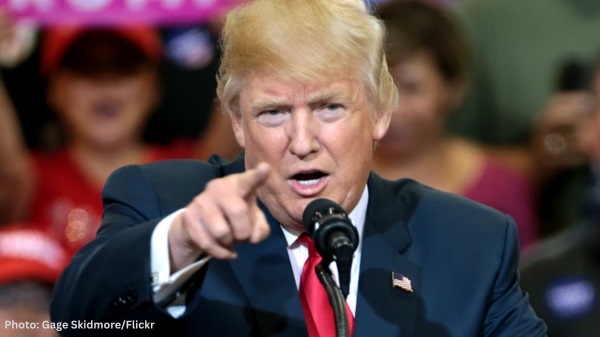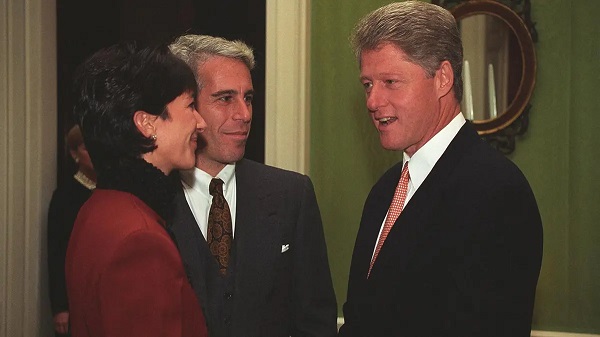International
‘Really, Really Difficult’: Bureaucrats Worry Behind Closed Doors They’ll Be Sent Packing Under Trump

From Heartland Daily News
“He’s going to get people in place that are more intelligent and are more loyal to him,” a park service employee said. “Now I think he could do a lot of damage.”
Government workers are reportedly in a state of panic over the prospect of former President Donald Trump winning another term in office, according to E&E News.
Bureaucrats up and down the federal hierarchy are concerned that a second Trump administration could cost them their jobs and put an end to liberal programs they worked to implement under President Joe Biden, E&E News reported. Trump has, if elected, pledged to implement reforms that would allow him to fire up to 50,000 civil servants at will, with the former president singling out workers who are incompetent, unnecessary or undermine his democratic mandate.
“The first rendition of the Trump administration was really, really difficult, and we saw a mass exodus of employees retiring,” a National Park Service employee told E&E News. “If we do have an administration shift, other employees will also reconsider their positions and move to the private sector. I don’t know what I’ll end up doing.”
Of the civil servants that didn’t exit during Trump’s first term, many worked internally to deliberately obstruct his agenda, according to Miles Taylor, who served as chief of staff in the Department of Homeland Security from 2017 to 2019 and admitted to engaging in such behavior. Bureaucrats are worried that Trump may seek to appoint administrators who agree with his agenda this time around.
“He’s going to get people in place that are more intelligent and are more loyal to him,” a park service employee said. “Now I think he could do a lot of damage.”
To replace large numbers of federal employees, Trump would reclassify them as Schedule F employees, allowing him to fire them at will. The Biden administration finalized a rule in April that would prevent their status from being changed involuntarily, however, allies of the former president have shrugged off the rule by pointing out that a Trump administration could simply reverse it, according to The New York Times.
Amid fear that Trump’s plans may come to fruition, bureaucrats are making moves to ensure the Biden administration’s policies are as hard to repeal as possible, a senior employee at the Interior Department told E&E News.
“The concern hasn’t been focused on who the Democratic nominee is as much as concerns about Trump winning and what that would mean,” they said. “From everyone’s perspective it is get as much done as possible. Also trying to bury into the agency programs [like environmental justice] so they can survive a Trump administration.”
Conservatives are increasingly optimistic about Trump’s chances of defeating Biden in November as the president lags behind Trump in the polls and the Democratic Party grapples with internal disputes regarding whether or not he should be their nominee.
“The mood is somber and incredulous,” one long-time employee of the Department of the Interior told E&E News. “The hope is we will not suffer through another term with the prior leadership, but the fear [is] that if we do, they will target employees they don’t like, make things up to justify whatever punishment they want and just cripple the good work we are doing.”
Staff at the Environmental Protection Agency (EPA), meanwhile, are also upset and agitated, the president of a union representing some of the agency’s employees told E&E News. “So many of our members lived through the absolutely disastrous first Trump administration and his attempted dismantling of EPA,” she said.
Originally published by The Daily Caller. Republished with permission.
Daily Caller
‘Almost Sounds Made Up’: Jeffrey Epstein Was Bill Clinton Plus-One At Moroccan King’s Wedding, Per Report


From the Daily Caller News Foundation
Former President Bill Clinton personally asked to bring Jeffrey Epstein and Ghislaine Maxwell as guests to the Moroccan King Mohammed VI’s 2002 wedding, a move that unsettled Clinton’s own aides, the New York Post reported Thursday.
Clinton requested permission to include Epstein and Maxwell at the royal wedding in Rabat despite neither having any official relationship with the Moroccan royal family, the Post reported. Sources told the outlet that Clinton’s request was viewed internally as inappropriate and has quietly circulated in Democratic circles for more than two decades.
“[Clinton] brought them as guests to a king’s wedding. I mean, it almost sounds made up,” one source familiar with the matter told the outlet. “How many times in your life have you been invited as a guest of a guest at a wedding?”
As a nonprofit, we are dependent on the generosity of our readers.
Please consider making a small donation of any amount here.
Thank you!

Clinton traveled to Morocco with Epstein and Maxwell aboard Epstein’s private jet, dubbed the “Lolita Express,” according to the Post. Chelsea Clinton attended separately, and then-Sen. Hillary Clinton remained in Washington due to her schedule.
“[Former First Lady] Hillary [Clinton] was in the Senate, so she couldn’t go. Chelsea very much wanted to go, and the president very much wanted to go,” a second person told the outlet. “The idea that they would take [Epstein] was a head-scratcher. But nonetheless, the Clinton office moved forward and made this request … to bring these two guests, and that’s what happened.”
Once in Rabat, Clinton, Epstein and Maxwell were seated with King Mohammed VI during the black-tie wedding dinner, sources said. At one point, Chelsea Clinton requested a group photograph that included her father, Epstein and Maxwell.
Maxwell is currently serving a 20-year federal prison sentence for sex trafficking conspiracy and related offenses. Epstein died in jail in 2019 while awaiting trial on federal sex trafficking charges. Their crimes were not publicly known at the time of the wedding.
The Clintons continue to downplay the extent of their past relationship with Epstein, maintaining that they cut off contact with him in 2005, three years before he pleaded guilty to state sex crimes in Florida.
Clinton spokesman Angel Ureña previously told the outlet that Clinton took four trips aboard Epstein’s jet between 2002 and 2003 and denied that Clinton ever visited Epstein’s private island or residences.
“I don’t know how many times we need to say there was travel more than 20 years ago before he was cut off. Apparently, we need to one more time. But nice try,” Ureña said, according to the outlet.

Neither of the sources quoted by the New York Post said they believed Clinton was aware of Epstein trafficking or sexually abusing children, but did say the ex-president is downplaying his former links to both Epstein and Maxwell.
The Clinton Foundation did not respond to the Daily Caller News Foundation’s request for comment.
Both Bill and Hillary are scheduled to give depositions in January to the House Oversight and Government Reform Committee about their ties to Epstein. The Oversight Committee subpoenaed the Clintons in August, and Committee Chairman James Comer said that if the Clintons didn’t appear for depositions scheduled for Dec. 17 and 18 or arrange to appear for questioning in early January, then contempt charges would be pursued.
Photos released by Oversight Committee Democrats in December show Epstein with prominent figures, including President Donald Trump, Bill Clinton, Microsoft co-founder Bill Gates and Steve Bannon.
The Department of Justice is expected to release a new trove of documents related to the Epstein investigation Friday.
Crime
Brown University shooter dead of apparent self-inflicted gunshot wound

From The Center Square
By
Rhode Island officials said the suspected gunman in the Brown University mass shooting has been found dead of an apparent self-inflicted gunshot wound, more than 50 miles away in a storage facility in southern New Hampshire.
The shooter was identified as Claudio Manuel Neves-Valente, a 48-year-old Brown student and Portuguese national. Neves-Valente was found dead with a satchel containing two firearms inside in the storage facility, authorities said.
“He took his own life tonight,” Providence police chief Oscar Perez said at a press conference, noting that local, state and federal law officials spent days poring over video evidence, license plate data and hundreds of investigative tips in pursuit of the suspect.
Perez credited cooperation between federal state and local law enforcement officials, as well as the Providence community, which he said provided the video evidence needed to help authorities crack the case.
“The community stepped up,” he said. “It was all about groundwork, public assistance, interviews with individuals, and good old fashioned policing.”
Rhode Island Attorney General Peter Neronha said the “person of interest” identified by private videos contacted authorities on Wednesday and provided information that led to his whereabouts.
“He blew the case right open, blew it open,” Neronha said. “That person led us to the car, which led us to the name, which led us to the photograph of that individual.”
“And that’s how these cases sometimes go,” he said. “You can feel like you’re not making a lot of progress. You can feel like you’re chasing leaves and they don’t work out. But the team keeps going.”
The discovery of the suspect’s body caps an intense six-day manhunt spanning several New England states, which put communities from Providence to southern New Hampshire on edge.
“We got him,” FBI special agent in charge for Boston Ted Docks said at Thursday night’s briefing. “Even though the suspect was found dead tonight our work is not done. There are many questions that need to be answered.”
He said the FBI deployed around 500 agents to assist local authorities in the investigation, in addition to offering a $50,000 reward. He says that officials are still looking into the suspect’s motive.
Two students were killed and nine others were injured in the Brown University shooting Saturday, which happened when an undetected gunman entered the Barus and Holley building on campus, where students were taking exams before the holiday break. Providence authorities briefly detained a person in the shooting earlier in the week, but then released them.
Investigators said they are also examining the possibility that the Brown case is connected to the killing of a Massachusetts Institute of Technology professor in his hometown.
An unidentified gunman shot MIT professor Nuno Loureiro multiple times inside his home in Brookline, about 50 miles north of Providence, according to authorities. He died at a local hospital on Tuesday.
Leah Foley, U.S. attorney for Massachusetts, was expected to hold a news briefing late Thursday night to discuss the connection with the MIT shooting.
-

 Crime2 hours ago
Crime2 hours agoBrown University shooter dead of apparent self-inflicted gunshot wound
-

 Business2 days ago
Business2 days agoOttawa Pretends To Pivot But Keeps Spending Like Trudeau
-

 Business13 hours ago
Business13 hours agoCanada Hits the Brakes on Population
-

 Crime1 day ago
Crime1 day agoThe Uncomfortable Demographics of Islamist Bloodshed—and Why “Islamophobia” Deflection Increases the Threat
-

 Crime1 day ago
Crime1 day agoBondi Beach Survivor Says Cops Prevented Her From Fighting Back Against Terrorists
-

 International1 day ago
International1 day agoHouse Rejects Bipartisan Attempt To Block Trump From Using Military Force Against Venezuela
-

 Energy2 days ago
Energy2 days agoLiberals Twisted Themselves Into Pretzels Over Their Own Pipeline MOU
-

 Frontier Centre for Public Policy16 hours ago
Frontier Centre for Public Policy16 hours agoCanada Lets Child-Porn Offenders Off Easy While Targeting Bible Believers








